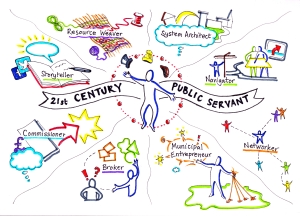The report highlights themes within the research and Catherine and Catherine highlight some here.
The first theme highlighted was roles within public services – and this isn’t just local government but all sectors that provide services to the public, inc private and 3rd sector. The kind of roles people talked about didn’t really fit the standard model – they talked about things like story tellers and system architects. Lead professionals who piece together different sectors of the service. But this is not about de-professionailsing the services but more like collating skills.
The report asks: How can we develop and support people to take on the broader range of roles?
What should these roles look like? We should be human, the overall response was we can be humane and empathize – we’re not in car insurance sales!
We should look at the the skills that public servants already have and support them – the fire service for instance need to work at heights but they also need to have people skills – but they only ask at how they do their job at height, not how they talk to people.
We can learn that public servants can work across multiple sectors and so training could reflect that and opportunities could be offered for secondments to up-skill people for “portfolio careers”. So What opportunities can we create with the public setor?
The public service ethos
A lot of people said the ethos of publicness was really important both from the local g’ment and private sector – although there is a shift towards a workers need to be more commercial – but do social carers understand what that means?
How do we support them?
How do we cope and survive perma-austerity – it’s both a good and bad thing – it creates paralysis some where teams lose so many staff but then it gives the opportunity for change and challenge. – The cuts are so big it’s not Salami slicing you wouldn’t have a salami that big – it’s hacking things off now.
Organisations need to be public, fluid and agile, not silo based. there has been a call for no more reconstructions. The public servants are trying to be 21st century but feel they are working in a 19th century org.
There also needs to be a move towards a more flexible working both with technology and hours. Younger workers have different expectations.
Leadership we need collaborative models of leadership moving away from traditional command and control models. Most orgs recongnised this and some orgs are already looking at this, So what can we do to promote leadership at diferent levels of the organisation.
Place plays a big part in being a 21st CPS – loyalty to locality of where staff are based, and if you are making a decision for the people in places you should really live with in the area you serve to really understand what the services in that area are like.
21CPS needs to be reflective – but we need to give them space and time to do that. Residents expect authentic interactions with their public servants – so we need to give them time and space to “sort things out” to allow them to behave like the services expect.
So what can appraisals, mentoring and peer support do to help Public Services acieve this.
The report poses lots of questions so this is a conversation that’s ongoing, How do we move on from here……

Reblogged this on The Power To Persuade.